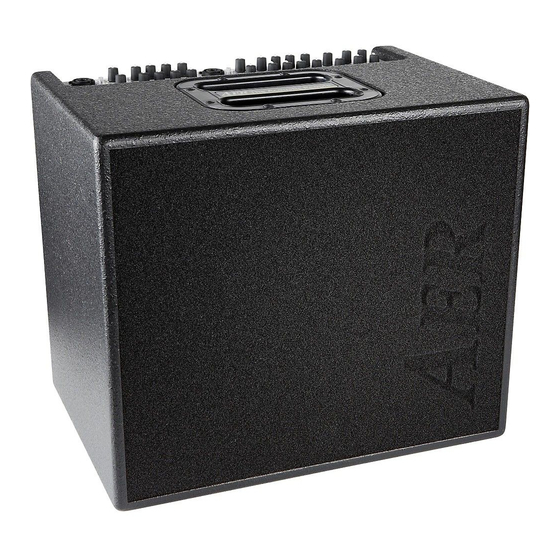- ページ 12
アンプ AER domino 3のPDF マニュアルをオンラインで閲覧またはダウンロードできます。AER domino 3 18 ページ。
AER domino 3 にも: ユーザーマニュアル (8 ページ), ユーザーマニュアル (16 ページ)

4. Starting up
4.1 Connecting and switching on
Before connecting to mains, please ensure that your
local mains voltage (e.g. 120V in the USA, 230V in Euro-
pe) matches the voltage rating of the device, which is
printed on the type label on the rear side of the unit.
Connecting to the wrong mains voltage may cause
serious damage to your amplifier!
If your amp is fitted with a mains voltage selector, the
voltage rating indicated on the voltage selector is
relevant.
Make sure the phantom power (see 5.3 phantom
power) is not switched on unintentionally.
Then connect all cables according to your application
and switch the device on. The green power LED indica-
tes operational readiness.
4.2 Level adjustment
By proper level adjustment you adapt the amplifier to
your signal sources (guitar pick-ups, microphones, etc.).
For this purpose keep the master control initially fully
anticlockwise.
Set the line/mic switch to position mic if you are using
a microphone. Position line is suitable for all types of
guitar pickups and most other sources.
The mute switch should not be pushed.
Now gradually increase the appropriate gain setting
as far as possible but without triggering the red clip
indicator, even when you play loud. Thereby you keep
some headroom for unexpected peak levels.
Very strong sources may cause a clipping warning
despite a low gain setting. Such sources can be attenu-
ated first by pushing the high/low switch.
Finally set the desired volume using the master control.
• If the gain setting is too low, the amplifier may not
reach the desired volume, or distracting noise may
become noticeable.
• Setting the gain too high causes distorted sound (clip-
ping). The clip light will warn you before this happens.
• If you use an instrument with a volume control, start
off with full volume but reduce it if the clip indicator
lights up early and the level adjustment is difficult.
• Please ensure there is always enough battery power
in your (active) pick-up system. Humming and sizzling
may be caused by an empty battery.
• If several inputs are used simultaneously, you also
determine the mixing ratio by the individual gain
settings.
14
• If several inputs are used simultaneously, you can
control the mixing ratio by the respective channel
volume controls.
• Also check the clip indicator while playing through all
inputs at the same time.
• The gain controls of any unused inputs should stay
fully anticlockwise.
5. Functional characteristics
5.1 Tone controls
The tone controls of the amplifier are a high-quality
sound modification tool that preserves the natural
tone of instruments and voice and allows you to apply
targeted accentuations.
If bass, middle, and treble are in center position,
contour is fully anticlockwise, and the colour switch is
not pushed, the tone controls are neutral and have no
influence on the sound.
The amplifier will already provide a very pleasant,
natural sound when all controls are in neutral position,
which you can then principally alter with the colour
filter (in channel 1). This will reduce the midrange and
bring out the trebles. The sound becomes more open
and lighter and is particularly suitable for finger picking
techniques. The tone controls can support or attenuate
the effect of the colour filter (see illustration below).
colour
bass
middle
colour
bass
middle
Please note:
The tone controls have an eff ect on the signal level. If
the clip indicator fl ashes more frequently, reduce the
level a bit using the gain control (see also 4.2).
treble
With colour-filter
(switched pressed)
reduce treble
to soften possible
harshness
treble
Without colour-filter
(switch not pressed)
boost treble to
brighten the sound
